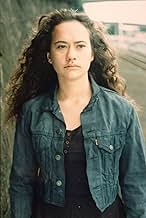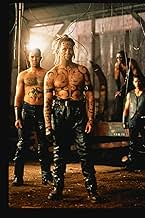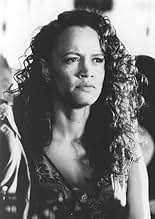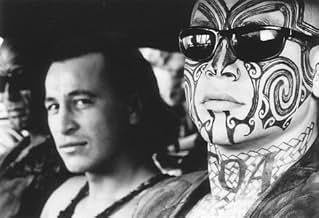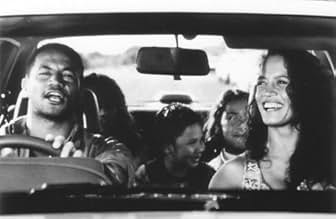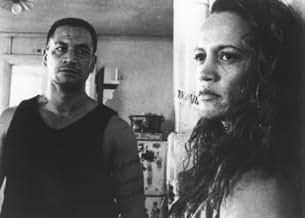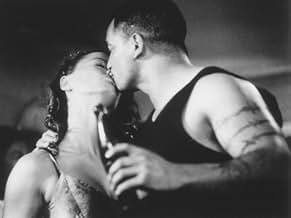AVALIAÇÃO DA IMDb
7,9/10
38 mil
SUA AVALIAÇÃO
Adicionar um enredo no seu idiomaA family descended from Maori warriors is bedeviled by a violent father and the societal problems of being treated as outcasts.A family descended from Maori warriors is bedeviled by a violent father and the societal problems of being treated as outcasts.A family descended from Maori warriors is bedeviled by a violent father and the societal problems of being treated as outcasts.
- Direção
- Roteiristas
- Artistas
- Prêmios
- 22 vitórias e 7 indicações no total
- Direção
- Roteiristas
- Elenco e equipe completos
- Produção, bilheteria e muito mais no IMDbPro
Avaliações em destaque
8=G=
"Once Were Warriors" tells of one woman's struggle to free herself and her family from the fist of abuse, the grip of oppression, and the slow assassination of self esteem at the hands of an alcoholic husband. This film's story of a Maori (indigenous New Zealanders) underclass family shows the male turning to violence and self destruction to vent frustration with his plight while the female draws strength from her cultural heritage in an attempt to save her children and restore their dignity. Gripping, intense, and powerful, "Once Were Warriors" is a critically acclaimed must see for anyone into serious human drama. (A)
10Emunah
I'm too speechless to say anything at length. The movie was... gut wrenching. I don't know if I can even recommend this film to people, because I'm seriously afraid it will give people nightmares for days on end. "Once Were Warriors" is a tough as nails, stomach churning, psychologically scarring and disturbing film about people and things that most are not even aware of exists. The whole cast should be commended for their incredible and brave performances. The person who deserves the most credit is Rena Owen who plays the female lead. Her performance blew me to pieces... she was absolutely superb. I've seen a lot of movies in my life, but never... never anything like this.
10kiwibeca
I've been reading the comments that people have made on this brilliant piece of film making that makes me proud to be a kiwi. Although I'm not Maori, I have somewhat of an understanding of, and a very deep appreciation for Maori culture. It is after all a major contributor to the uniqueness of New Zealand, and it's what a lot of the tourists come here to see/experience.
Some people have commented that the character of Beth is "descended from Maori royalty" and that the character of Jake is "descended from slaves". That's not quite correct. Although there is a Maori monarch; (Dame Te Atairangikaahu, the current Maori queen lives at the Turangawaewae Marae in Ngaruawahia, her official residence.) the Maori monarchy only goes back to the 19th century, and its not really representative of all Maori as it only really affects Waikato iwi/hapu, (tribe/sub tribe) It is more likely that Beth would be descended from chiefly linage, and hence she and her whanau, (extended family) would be very much aware of and in tune with their whakapapa or ancestry. Beth's line near the end of the movie that her people "once were warriors" is an indicator of this.
(The facial and body tattoos, or Moko that one sometimes sees Maori wearing are in fact representative of their whakapapa. Also, the carvings that feature on Marae and other carved Maori buildings/gates etc are representative of tribal ancestors, much like Indian Totem poles.)
Jake on the other hand is obviously urbanized. He would most probably know little or nothing about his whakapapa, and in addition he probably would not even be able to identify with an iwi or hapu. This would explain why he makes several references to "Maori bulls***". He is disenfranchised from his culture, and probably doesn't even speak Maori that well. (Although Temurera Morrison himself speaks fluent Maori.) His family have obviously been living in Auckland for so long, and there has been such tribal intermingling, that he doesn't know whether he's Arthur or Martha. And what's more, he doesn't care either.
(For those of you who are interested, the motorway shown at the start of the movie is the Southern Motorway which runs right through South Auckland, which is where *a lot* of Maoris and Pacific Islanders live.)
As other people have said, this kind of thing is sadly not unique to Maori, as American/Canadian Indians and Australian Aborigines can testify. Likewise domestic violence itself is not only limited to minority ethnic groups.
This is easily one of the best movies that I have ever seen. So if you haven't had the privilege of seeing it yet, then I highly recommend that you do so. George Henare's stirring Taiaha scene alone is well worth the cost of getting the movie out.
(A Taiaha is a Maori spear. To use one of these, one must have immense mana, or importance. As Henare's character said, the British *feared* the highly skilled Taiaha warriors.)
Some people have commented that the character of Beth is "descended from Maori royalty" and that the character of Jake is "descended from slaves". That's not quite correct. Although there is a Maori monarch; (Dame Te Atairangikaahu, the current Maori queen lives at the Turangawaewae Marae in Ngaruawahia, her official residence.) the Maori monarchy only goes back to the 19th century, and its not really representative of all Maori as it only really affects Waikato iwi/hapu, (tribe/sub tribe) It is more likely that Beth would be descended from chiefly linage, and hence she and her whanau, (extended family) would be very much aware of and in tune with their whakapapa or ancestry. Beth's line near the end of the movie that her people "once were warriors" is an indicator of this.
(The facial and body tattoos, or Moko that one sometimes sees Maori wearing are in fact representative of their whakapapa. Also, the carvings that feature on Marae and other carved Maori buildings/gates etc are representative of tribal ancestors, much like Indian Totem poles.)
Jake on the other hand is obviously urbanized. He would most probably know little or nothing about his whakapapa, and in addition he probably would not even be able to identify with an iwi or hapu. This would explain why he makes several references to "Maori bulls***". He is disenfranchised from his culture, and probably doesn't even speak Maori that well. (Although Temurera Morrison himself speaks fluent Maori.) His family have obviously been living in Auckland for so long, and there has been such tribal intermingling, that he doesn't know whether he's Arthur or Martha. And what's more, he doesn't care either.
(For those of you who are interested, the motorway shown at the start of the movie is the Southern Motorway which runs right through South Auckland, which is where *a lot* of Maoris and Pacific Islanders live.)
As other people have said, this kind of thing is sadly not unique to Maori, as American/Canadian Indians and Australian Aborigines can testify. Likewise domestic violence itself is not only limited to minority ethnic groups.
This is easily one of the best movies that I have ever seen. So if you haven't had the privilege of seeing it yet, then I highly recommend that you do so. George Henare's stirring Taiaha scene alone is well worth the cost of getting the movie out.
(A Taiaha is a Maori spear. To use one of these, one must have immense mana, or importance. As Henare's character said, the British *feared* the highly skilled Taiaha warriors.)
This is a film that should be seen by everyone. A powerful movie that will stir almost every emotion you can think of, and sometimes all at once. Completely believable and compelling film that will hold you till the very end, and a long time after.
This movie is based on a modern day New Zealand family, dealing with near poverty and violence from all sides, including the often inebriated father.
The acting in this movie was just plain amazing. I was hooked from beginning to end, entranced with the wide range of feelings and emotions the movie evoked in me.
You will cry, laugh, sing, and rage right along with the characters, and you will find it hard not to restart the movie just to watch it again.
This is just one of the few movies that stayed with me all these years, since first seeing it back in 1995. I will never forget this movie, and if you watch it, I can guarantee that neither will you.
The acting in this movie was just plain amazing. I was hooked from beginning to end, entranced with the wide range of feelings and emotions the movie evoked in me.
You will cry, laugh, sing, and rage right along with the characters, and you will find it hard not to restart the movie just to watch it again.
This is just one of the few movies that stayed with me all these years, since first seeing it back in 1995. I will never forget this movie, and if you watch it, I can guarantee that neither will you.
Você sabia?
- CuriosidadesTemuera Morrison would get challenged to fight all the time by local thugs after seeing him play Jake Heke.
- Erros de gravaçãoWhen Beth is being beaten by Jake at the start of the film she is thrown into a mirror which shatters completely. Later when the children are cleaning up the mess the mirror is back on the wall with only a few cracks.
- Cenas durante ou pós-créditosMost of the opening credits are either split in half, scattered in different areas of the screen, abnormally shaped or used in small white print. Some are even mixed.
- Trilhas sonorasOnce Were Warriors (The Awakening)
Performed by Tama Renata
Principais escolhas
Faça login para avaliar e ver a lista de recomendações personalizadas
- How long is Once Were Warriors?Fornecido pela Alexa
Detalhes
- Data de lançamento
- País de origem
- Central de atendimento oficial
- Idiomas
- Também conhecido como
- Somos guerreros
- Locações de filme
- Empresas de produção
- Consulte mais créditos da empresa na IMDbPro
Bilheteria
- Faturamento bruto nos EUA e Canadá
- US$ 1.608.570
- Faturamento bruto mundial
- US$ 1.608.610
Contribua para esta página
Sugerir uma alteração ou adicionar conteúdo ausente

Principal brecha
What is the Brazilian Portuguese language plot outline for O Amor e a Fúria (1994)?
Responda


